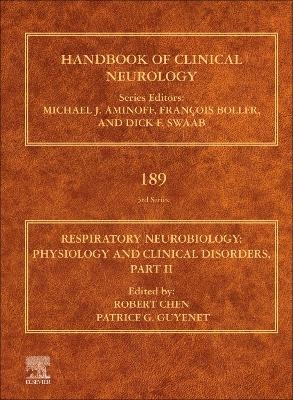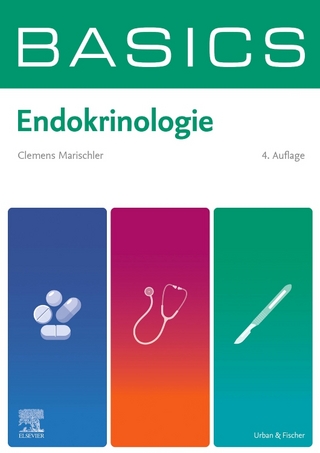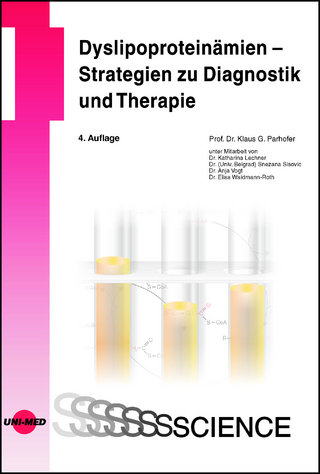
Respiratory Neurobiology
Elsevier - Health Sciences Division (Verlag)
978-0-323-91532-8 (ISBN)
Dr. Robert Chen received MA and medical degrees (MBBChir) from the University of Cambridge and M.Sc. from the University of Toronto. He undertook Neurology residency at the Western University, and fellowship at the National Institute of Neurological Disorders and Stroke. He is currently Professor of Medicine (Neurology) at the University of Toronto, the Catherine Manson Chair in Movement Disorders, Senior Scientist at the Krembil Brain Institute, a full member of the Institute of Medical Science at the University of Toronto, Editor-in-Chief of the Canadian Journal of Neurological Sciences and Associate Editor for Movement Disorders. His research interests include human motor physiology, brain plasticity and understanding the pathophysiology and development of new treatments for movement disorders such as Parkinson’s disease and dystonia. He has published over 350 research papers with Google Scholar H-index of over 100. Dr. Guyenet is a neuroscientist, Professor of Pharmacology, with a career spanning 42 years on the faculty of the University of Virginia (UVa) School of Medicine (Charlottesville, VA, USA). Born in France, he received his undergraduate education in the basic sciences at Ecole Normale Supérieure, Paris (1967-1971). He earned a Ph.D. in neuropsychopharmacology from College de France, Paris, under the direction of College de France Professor Jacques Glowinski where his scientific career was launched (1972-1975). This was followed by postdoctoral studies in neurophysiology at Yale University (1976-1978) mentored by Dr. GK Aghajanian. Dr. Guyenet joined the faculty of the University of Virginia School of Medicine, Department of Pharmacology in 1978 pursuing a basic research focus on the autonomic nervous system and breathing. His research is a branch of Integrative Neuroscience, a discipline that seeks to understand how the brain processes specific types of information. The laboratory studies how the mammalian brain regulates respiration and blood pressure, two physiological processes that are dysfunctional in highly prevalent diseases (hypertension, obesity, apneic syndromes, heart failure, etc.). Continuously supported by the National Institutes of Health, Heart, Lung and Blood Institute, his research program has contributed to seminal progress in the field. A key advance has been the characterization of a lower brainstem nucleus that senses pH and maintains blood CO2 constant by adjusting lung ventilation (the retrotrapezoid nucleus). This work has given a new impetus to the study of central respiratory chemoreception, a field that is rapidly growing in the US and elsewhere. Dr. Guyenet and collaborators have published 243 articles in refereed scientific journals, including high impact publications such as Science, Nature, and Nature Neuroscience. His influence in the field is reflected by his scientific impact metrics (h-index 99; 28,000 citations). Dr. Guyenet and his lab have received several awards including the NIH-HLBI Merit Award, the Carl Ludwig Distinguished lecture of the American Physiological Society, 2008, and UVa Distinguished Scientist Award, 2011. Additionally, Dr. Guyenet received the Edlich-Henderson Inventor of the Year Award (1996) along with colleagues J. Jagger, R. Pearson and J. Brand granted in recognition of three patents, two of which were successfully commercialized. Along with research, teaching and mentoring has been integral to Dr. Guyenet’s academic contributions. Over four decades Dr. Guyenet mentored 15 PhDs and 24 postdoctoral scholars, many of whom have faculty positions in the US and elsewhere. He has been rewarded many times over by medical students for his teaching contributions including the Medical School Student Basic Sciences Teaching Awards (9 times) and the UVa Medical School Award for Excellence in Teaching (1995, 2003). Dr. Guyenet is especially grateful to his department chairmen, Drs. J. Larner, J. Garrison and D. Bayliss for their unflagging support and the freedom to seek his own path. Most importantly, he acknowledges the immense debt he owes to his enthusiastic, hard-working, and talented collaborators. Finally, Dr. Guyenet thanks profusely everyone who has contributed to these twin volumes on Respiratory Neurobiology and hopes that the final product will be helpful to clinicians and basic scientists alike, as a scholarly reference or, hopefully, as an inspiration to move the field to new heights.
Section I. Assessment of the respiratory system in neurological disorders 1. Pulmonary function testing in neuromuscular disease 2. Electrophysiological assessment of respiratory function
Section II. Primary breathing disorders 3. Apnea of prematurity and sudden infant death syndrome 4. Developmental diseases affecting the respiratory system: CCHS and ROHHAD 5. Central sleep apnea 6. Obstructive sleep apnea
Section III. Neurological disorders affecting respiration 7. Breathing disturbances in Rett syndrome 8. Sudden unexpected death in epilepsy: Respiratory mechanisms 9. Multiple Sclerosis and related disorders 10. Stroke and breathing 11. Breathing disorders in neurodegenerative diseases 12. Spinal cord injury and degenerative cervical myelopathy 13. Motor neuron, peripheral nerve, and neuromuscular junction disorders 14. Phrenic nerve paralysis and phrenic nerve reconstruction surgery
Section IV. Cardiovascular disorders affecting respiration 15. Sleep and breathing disorders in heart failure 16. Neurological effects of respiratory dysfunction 17. Neurologic complications of coronavirus and other respiratory viral infections
Section V. Treatment considerations for respiratory dysfunction in neurological disorders 18. Noninvasive and invasive mechanical ventilation for neurologic disorders
| Erscheinungsdatum | 03.01.2023 |
|---|---|
| Reihe/Serie | Handbook of Clinical Neurology |
| Verlagsort | Philadelphia |
| Sprache | englisch |
| Maße | 195 x 260 mm |
| Gewicht | 1120 g |
| Themenwelt | Medizinische Fachgebiete ► Innere Medizin ► Endokrinologie |
| Medizinische Fachgebiete ► Innere Medizin ► Pneumologie | |
| Medizin / Pharmazie ► Medizinische Fachgebiete ► Neurologie | |
| ISBN-10 | 0-323-91532-9 / 0323915329 |
| ISBN-13 | 978-0-323-91532-8 / 9780323915328 |
| Zustand | Neuware |
| Haben Sie eine Frage zum Produkt? |
aus dem Bereich


